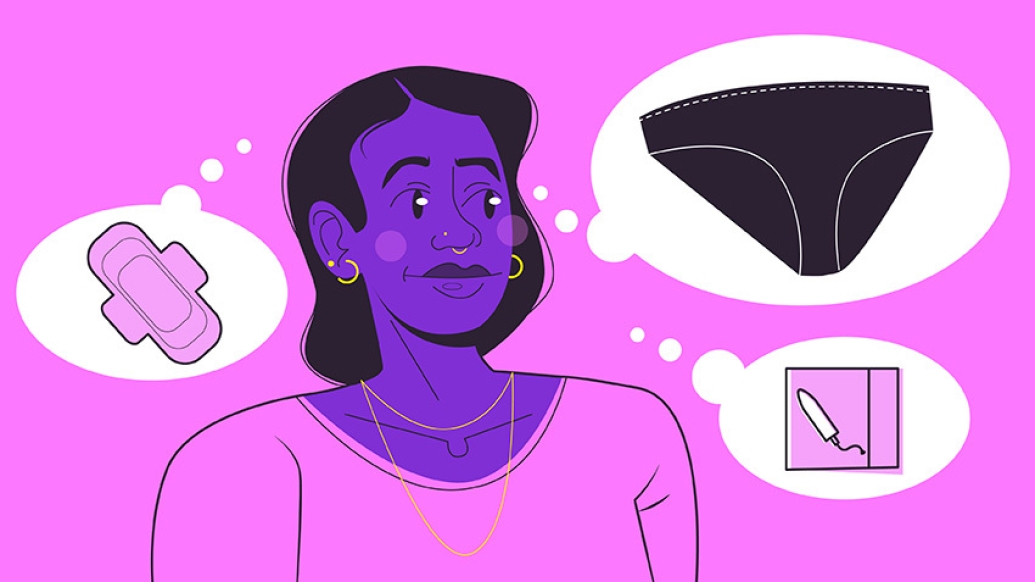The new technology makes periods easier and more comfortable to manage, but are they right for you? An OB-GYN shares 5 facts to know before buying a pair.
5:00 AM
Author |

Period underwear have quickly become mainstream, and a favorite menstrual product, according to nearly daily discussions in the office of Melina Dendrinos, M.D. She is a pediatric and adolescent gynecologist with the University of Michigan Health Von Voigtlander Women's Hospital who also helps adults with gynecologic issues.
"I get more people telling me they're using it than asking about it," said Dendrinos, but she's quick with information when newbies seek her expertise on how it works. Here is her primer on period underwear:
What is period underwear?
It's washable, reusable underwear that absorbs menstrual blood and prevents leaks from getting on clothes.
"I describe it like there's a pad that's sewn inside the underwear. While you can't see it, there's an absorbent area in your underwear where you would wear a pad," Dendrinos said.
Each brand tends to have a different objective and different absorbency. Read labels to understand if they:
-
Hold a pad in place
-
Block leaks
-
Hold a pad in place and block leaks
-
Absorb menstrual blood
-
Prevent leaks and absorb menstrual blood
What style you choose depends on comfort, flow level and when the next time you may be able to change to a fresh product. Companies recommend no more than 12 hours of wear time to prevent odors or leakage.
Each style has three or four layers of material. The top layer is moisture wicking, so the wearer always feels dry. The material is usually black, so the wearer never sees any blood. The second "optional" antimicrobial layer neutralizes odors. The third layer absorbs up to five tampons worth of blood. The final layer is leak resistant to help curb possible period stains.
Who uses period underwear?
Menstruating people of all ages use period underwear. Often, they combine it with a pad, a tampon or a menstrual cup.
Others wear it as a form of prevention.
Some brands market thinner, smaller underwear for those who are preparing for their first period. Since they don't know exactly when it will happen, period underwear can help prevent any accidents while at school.Melina Dendrinos, M.D.
"Some brands market thinner, smaller underwear for those who are preparing for their first period. Since they don't know exactly when it will happen, period underwear can help prevent any accidents while at school," Dendrinos said.
Caregivers also find period underwear a better option when assisting loved ones with a developmental or cognitive delay or a chronic illness that prohibits certain movements that make changing pads or tampons difficult.
"These can be really helpful," she said.
Why use period underwear?
Comfort, cost savings and environmental friendliness are the top reasons her patients prefer period underwear, Dendrinos said. Most claim they are more comfortable than any product on the market. While some report a need to get used to free bleeding, the moisture wicking layer assists with that.
While the initial cost of purchasing period underwear can be steep – with companies charging $13–$75 for a pair – reusability makes it cost effective. A menstruating person uses on average 17,000 pads or tampons over a lifetime, costing about $1,800, according to the American Medical Association.
And by using disposable period products, 250 to 300 pounds of pads, tampons, and applicators are disposed of over a person's lifetime, according to Flow: The Cultural History of Menstruation. Period underwear would lower that landfill number.
They also cut down on last-minute laundry. Period accidents often require immediate laundering to get stains out of clothing and bed sheets.
Is period underwear sanitary?
If you wash them in between uses, period underwear are sanitary. Most manufacturers recommend rinsing them by hand before putting them into a washing machine, Dendrinos said. "I typically skip that step and throw them in with my other laundry," she said.
Manufacturers suggest air drying because of the presence of elastic. However, air drying will take longer than usual. Because of the material's absorbency, some may take up to 48 hours to air dry. Be sure to read the laundering instructions before purchasing.
The easier a product is to use, the more likely you'll embrace it, Dendrinos points out.
How do I know it's the right fit?
To get the right fit, Dendrinos suggests following your true underwear size and trying them on while wearing a pair of regular underwear underneath.
If they're too tight, it will cut into the stomach or thigh area and, if they're too loose, they'll be baggy in those areas. A good comfortable fit will prevent leakage and ensure satisfaction.
Dendrinos bought her first pair of period underwear online about three years ago when patients mentioned they were using them. "I just wanted to try them out. You know, I think because of what I do, I wanted to know what people are using and how they work."
She was hooked.
She uses period underwear at night. "I don't have to use any other product at night, so it's comfortable," she said, and, like her patients have found, they are perfect for a good night's sleep without the fear of leakage.
Live your healthiest life: Get tips from top experts weekly. Subscribe to the Michigan Health blog newsletter
Headlines from the frontlines: The power of scientific discovery harnessed and delivered to your inbox every week. Subscribe to the Michigan Health Lab blog newsletter
Like Podcasts? Add the Michigan Medicine News Break on Spotify, Apple Podcasts or anywhere you listen to podcasts.

Explore a variety of health care news & stories by visiting the Health Lab home page for more articles.

Department of Communication at Michigan Medicine
Want top health & research news weekly? Sign up for Health Lab’s newsletters today!





